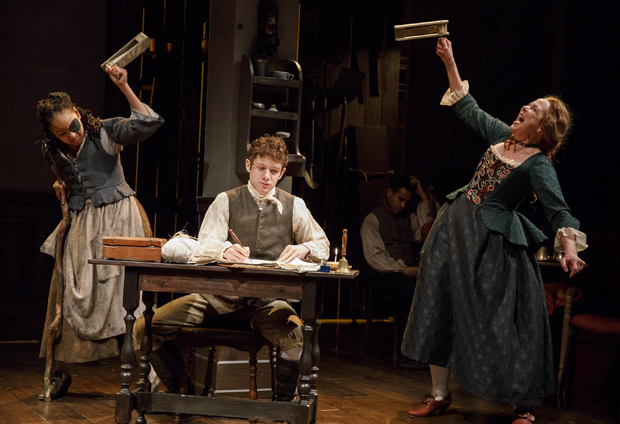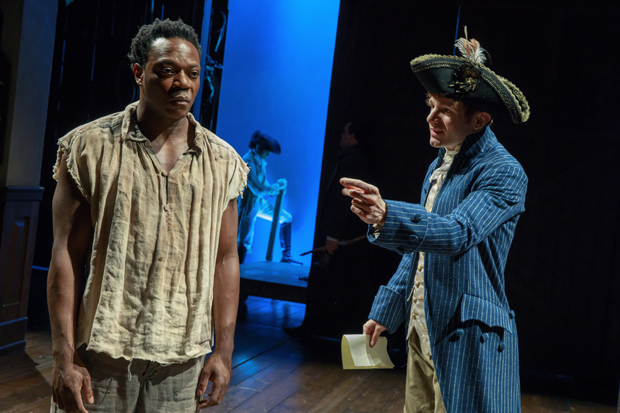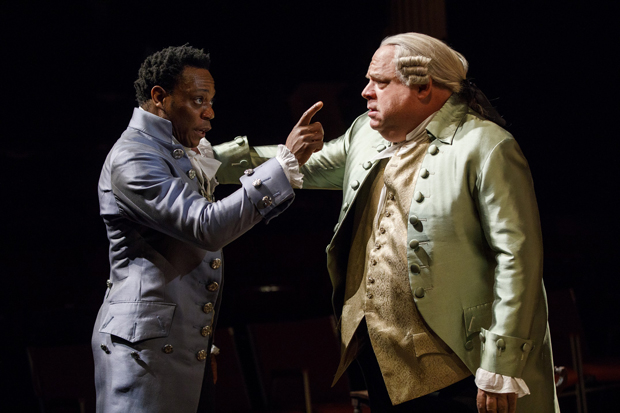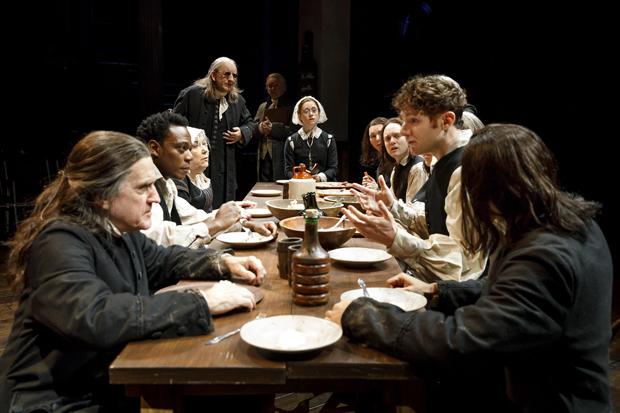A Lowdown Tale of American Capitalism in The Low Road
Bruce Norris brings his historical fable to the Public Theater.

(© Joan Marcus)
"If you look very carefully, you’re sure to find a thief or two in the family tree of every millionaire." So proclaims Adam Smith, echoing Honoré de Balzac in his narration of The Low Road, Bruce Norris's wickedly clever takedown of American history and the Horatio Alger myth through which we view so much of it. Yes, it's that Adam Smith, portrayed by Daniel Davis with a faint Scottish brogue and tricorn hat, in this timely Public Theater production.
We shouldn't be too surprised that Norris has put such jaundiced words in the mouth of the prophet of the free market. He has always armed himself with a sharp sense of irony, most notably in his 2011 Pulitzer Prize-winning drama, Clybourne Park, and The Pain and the Itch, which took aim at the hypocrisy of the very kind of people who attend off-Broadway theater. The Low Road does that too, but not until the second act of this wildly ambitious and endlessly entertaining new comedy.

(© Joan Marcus)
Set in the years leading up to the American Revolution, it tells the story of Jim Trewitt (Chris Perfetti), who was abandoned as an infant at the doorstep of a Massachusetts brothel with a letter signed "G. Washington of Virginia." Proprietress Dolly Trewitt (the ever-hilarious Harriet Harris) raises Jim like a son, and he eventually runs the family business. He becomes enamored with the free market after reading a portion of Smith's The Wealth of Nations and concocts a plan to invest their income in bonds. Not content to merely manage the money of hard-working prostitutes, he goes in search of his famously rich father. He also purchases a slave with an unlikely past, John Blanke (Chukwudi Iwuji). Wealth and violence perform a mad jig in the ensuing adventure, an acid satire of capitalism taking place in a theater that enjoys the generous patronage of Bank of America.
Norris is acutely aware of the absurd position of artists in this system, something that is stingingly apparent when our protagonists become guests of wealthy New York merchant Isaac Low (Kevin Chamberlin) and his liberal wife, Margarita (Harris), who fancies herself a philanthropist. She gives Blanke money to produce stage entertainments for her soirees, and he uses them as a platform to bite the hand that feeds him — a sensation the Lows seem to fetishize.

(© Joan Marcus)
That's only a small portion of an epic plot that director Michael Greif manages to squeeze onto a small thrust stage. David Korins's set resembles a colonial meeting house, but Ben Stanton's evocative lighting, Matt Tierney's jarring sound design, and Emily Rebholz's detailed period costumes allow it to transform into a number of locations with seamless ease.
Greif and Norris present the first act with Brechtian flair, employing projected scene titles, broad stroke performances, and the kind of narration that rudely interrupts the stage action to TEACH US SOMETHING. Yet just when we think we've figured this shtick out, Norris changes the game, especially during a jaw-dropping entr'acte that is the kind of inventive social critique that isn't so easy to dismiss.
None of it would be possible without an immensely talented ensemble of 18 playing many roles and credibly affecting multiple accents. Perfetti only plays Jim, but he flawlessly embodies the squeaky indignation of a 14-year-old who has just put down his first copy of Atlas Shrugged convinced that Ayn Rand is writing only to him. He gets into a heated exchange with a young Puritan named Constance (a rock-steady Susannah Perkins), who would clearly favor Marx were this set in a later century (much of their debate suspiciously resembles what one might hear over the Thanksgiving dinner of a politically mixed family circa 2018). Chukwudi gives a beguiling performance as a character who is a very gifted actor in his own right. Equally persuasive is Crystal A. Dickinson, who portrays a slave named Mary and delivers a heartbreakingly honest speech about how tangible comfort usually trumps intangible ideas like "freedom."

(© Joan Marcus)
Three years after the Public Theater entranced New York with a glorious musical revolution, The Low Road arrives like the anti-Hamilton: Norris depicts our forefathers not as visionary heroes, but unscrupulous scoundrels and blinkered elites (it cannot be a coincidence that Margarita Low was an actual member of the Schuyler family). In this story, our continent is not a land of dreams made manifest, but something closer to its original purpose: a repository for Europe's refuse. All of this makes Norris a renegade whose version of our mythic history may come off disagreeable, but with which you will find it very hard to substantively disagree.
He is wrong about one thing, though: We seem meant to smile and shake our heads when Blanke asks, "If it is political change we would effect, is not a play the most inefficient possible means of achieving it?" He might want to use a Ouija board and ask Beaumarchais, whose revolution-inspiring Marriage of Figaro is remembered as the theatrical equivalent of lighting a match in an oily rag-filled rococo salon. The Low Road may not spark a second American Revolution, but by bringing its incendiary message directly to New York's upper-middle class, Norris is speaking to the people most likely to rewrite the rules for the next century. It couldn't come at a better time as we collectively ask, Is any of this really working?








